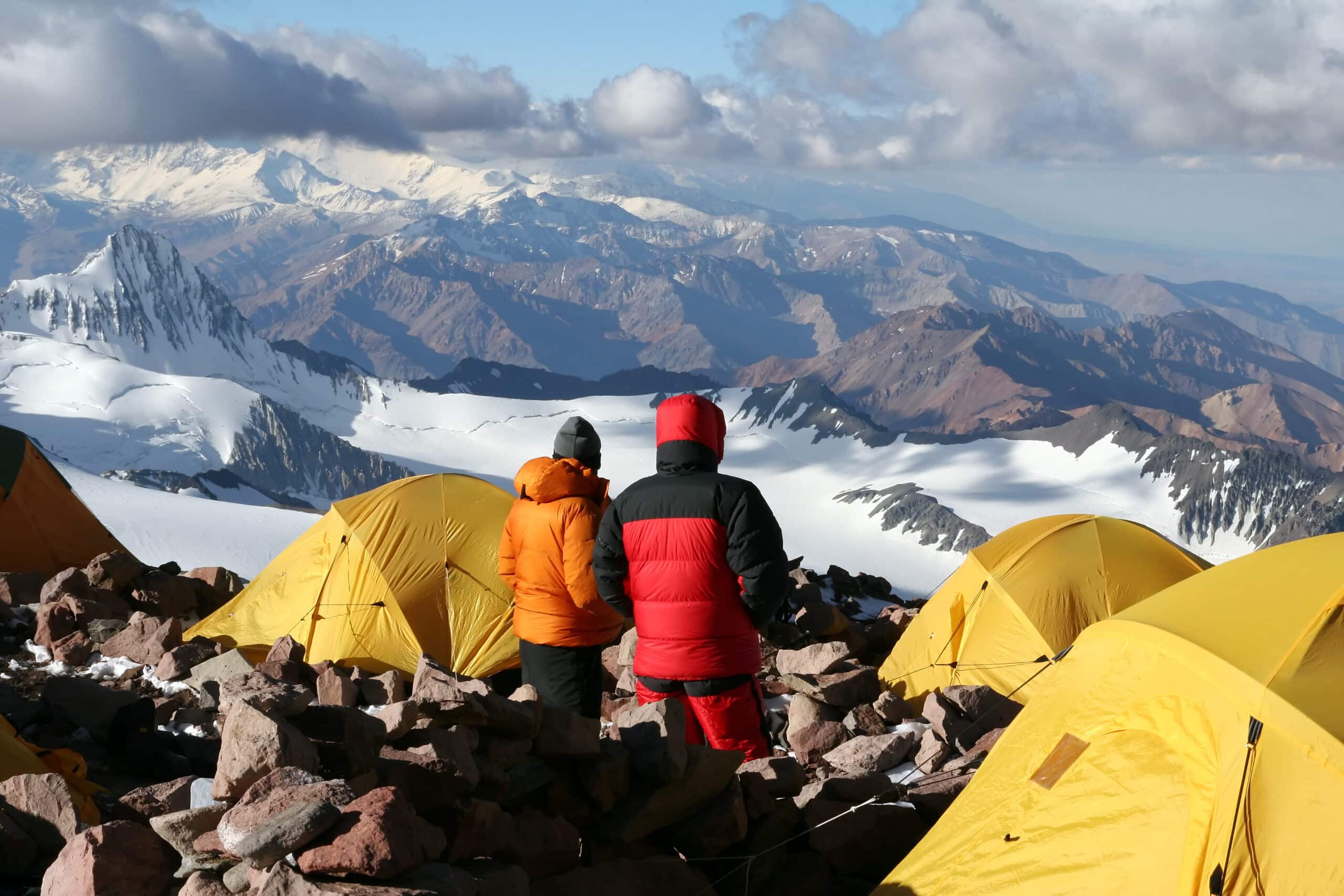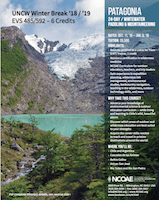UNCW Students Can Earn 6 Credits While on Winter Break in Patagonia
July 24, 2018
How would you like to spend three weeks in windswept Patagonia, summiting a 19,000-foot-high peak in the Andes, taking on Class III and IV rapids alongside a volcano — and picking up six college credits for adding this adventure to your academic experience?
The University of North Carolina-Wilmington (UNCW) is offering this 24-day course (EVS 485/592) during the upcoming winter 2018 break, and the classroom is as described above — Patagonia, a nearly 300,000-square-mile area shared by Chile and Argentina that features the imposing Andes mountain range, deserts, plains, rocky coastlines and ice fields. This pristine real estate is enormous, yet only 5 percent of the populations of both countries live there.
And it’s available to adventure-seeking Seahawks as the result of an academic partnership between UNCW and us — the Wilmington-based National Center for Outdoor & Adventure Education (NCOAE). Our renowned center promotes critical thinking, environmental stewardship, and the acquisition of technical outdoor skills through accredited outdoor and adventure-based experiential education courses.
Far More Than Just an Outdoor Adventure
This Patagonia-based mountaineering and whitewater paddling adventure — scheduled from Dec. 11 through Jan. 3 and timed to coincide with UNCW’s winter break — is among the newly approved academic activities targeting students within the university’s Department of Environmental Sciences (EVS).
Far more than just an outdoor adventure, students who sign up and complete the requirements for the course will become more knowledgeable about outdoor education in extreme environments than their counterparts who rely on a classroom setting and school books for such experiences.
If you choose to enroll, you will have the opportunity to receive training in remote expedition planning, wilderness risk management, backcountry navigation, as well as instructor-level use of NCOAE’s accredited curriculum. In addition to learning about Leave No Trace outdoor ethics — and receiving certification in same — you will be introduced to basic and advanced camp craft and NCOAE’s noted core curriculum.
You will gain the skills and knowledge to expertly explore remote areas and differing environments, with an emphasis on mountaineering and whitewater rafting, kayaking and paddleboarding. And outdoor classroom discussions and study will include issues of environmental sustainability — not only within the southernmost boundaries of South America, but here at home as well.
Many of the Course’s Outcomes are Tied to Sustainability
Students will also gain an understanding of sustainability as an expansive set of principles, ideals and initiatives. Specifically, the course focuses on the physical, biological, and human dimensions of the locations traveled to and through within Chile.
Once you complete this course, and upon your return to the university, you should be well equipped to:
- Understand concepts of land use management, and related environmental issues.
- Understand sustainability issues and environmental ethics in a local, regional and a global setting.
- Identify and explain core principles and concerns of sustainability issues and examine challenges, concepts, practices and success stories of sustainability issues in case studies.
- Understand the interconnectedness and interdependence of sustainability issues.
- Be able to apply the principles of environmental sustainability to solve real-world problems.
A brief itinerary and highlights of the 24-day Patagonia course include:
- A two-day introduction to camp craft and The National Center for Outdoor & Adventure Education’s core curriculum, along with Leave No Trace training and expedition planning, preparation and packing.
- Three days at Banos Colina, a high-altitude destination offering 360-degree views of a very vast and varied land.
- Six days of mountaineering on the Andes main summit of Volcan San Jose (within a volcanic environment made up of four summits). You will traverse ridgelines and scrambling along seracs (e., blocks of ice that have detached from the main glacier).
- Five days of classroom lessons in a geodesic dome at our base in Pucon.
- Five more days of whitewater kayaking, stand-up paddle boarding and rafting instruction that includes guiding a raft through Class III and IV rapids. Here, you will become skilled in the Eskimo roll — all in the warmth of a hot springs pool — as well as learn how to read river currents.
- The adventure concludes with a three-day paddle and camping trip along the Rio San Pedro.
Sounds amazing, right? For more information, visit the Patagonia Backpacking & Whitewater Paddling Course page on our website, or talk to UNCW Environmental Sciences Chair, Dr. Jeffery Hill or NCOAE Executive Director, Zac Adair. You can also contact the NCOAE office in Wilmington by calling (910) 399-8090, or email the office using info at NCOAE dot org.
TALK TO US
Have any further questions about our courses, what you’ll learn, or what else to expect? Contact us, we’re here to help!


Leave a comment